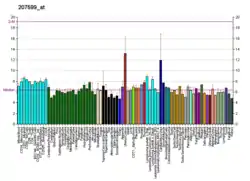MMP20
Matrix metalloproteinase-20 (MMP-20) also known as enamel metalloproteinase or enamelysin is an enzyme that in humans is encoded by the MMP20 gene.[5][6]
Function
Proteins of the matrix metalloproteinase (MMP) family are involved in the breakdown of extracellular matrix in normal physiological processes, such as embryonic development, reproduction, and tissue remodeling, as well as in disease processes, such as arthritis and metastasis. Most MMP's are secreted as inactive proproteins which are activated when cleaved by extracellular proteinases.
MMP-20, also known as enamelysin, appears to be the only MMP that is tooth-specific and it is expressed by cells of different developmental origin (i.e. epithelial ameloblasts and mesenchymal odontoblasts).
Clinical significance
The human MMP-20 gene contains 10 exons and is part of a cluster of matrix metalloproteinase genes that localize to human chromosome 11q22.3.[6] A mutation in this gene, which alters the normal splice pattern and results in premature termination of the encoded protein, has been associated with amelogenesis imperfecta. Enamel in the absence of MMP-20 is hypoplastic (thin), contains less mineral (only one-third as much total mineral as wild type), and contains more protein and water. In general, MMP-20 functions in enamel are to cleave enamel matrix proteins at specific cleavage sites.[7]
References
- GRCh38: Ensembl release 89: ENSG00000137674 - Ensembl, May 2017
- GRCm38: Ensembl release 89: ENSMUSG00000018620 - Ensembl, May 2017
- "Human PubMed Reference:". National Center for Biotechnology Information, U.S. National Library of Medicine.
- "Mouse PubMed Reference:". National Center for Biotechnology Information, U.S. National Library of Medicine.
- Llano E, Pendas AM, Knauper V, Sorsa T, Salo T, Salido E, Murphy G, Simmer JP, Bartlett JD, Lopez-Otin C (Jan 1998). "Identification and structural and functional characterization of human enamelysin (MMP-20)". Biochemistry. 36 (49): 15101–15108. doi:10.1021/bi972120y. PMID 9398237.
- "Entrez Gene: MMP20 matrix metallopeptidase 20 (enamelysin)".
- Moradian-Oldak J (2012). "Protein-mediated enamel mineralization". Front. Biosci. 17 (7): 1996–2023. doi:10.2741/4034. PMC 3442115. PMID 22652761.
Further reading
- Nagase H, Woessner JF (1999). "Matrix metalloproteinases". J. Biol. Chem. 274 (31): 21491–21494. doi:10.1074/jbc.274.31.21491. PMID 10419448.
- Bartlett JD, Simmer JP (2000). "Proteinases in developing dental enamel". Crit. Rev. Oral Biol. Med. 10 (4): 425–441. doi:10.1177/10454411990100040101. PMID 10634581.
- Pendás AM, Santamaría I, Alvarez MV, et al. (1997). "Fine physical mapping of the human matrix metalloproteinase genes clustered on chromosome 11q22.3". Genomics. 37 (2): 266–269. doi:10.1006/geno.1996.0557. PMID 8921407.
- Stracke JO, Fosang AJ, Last K, et al. (2000). "Matrix metalloproteinases 19 and 20 cleave aggrecan and cartilage oligomeric matrix protein (COMP)". FEBS Lett. 478 (1–2): 52–56. doi:10.1016/S0014-5793(00)01819-6. PMID 10922468. S2CID 37366875.
- Terp GE, Christensen IT, Jørgensen FS (2000). "Structural differences of matrix metalloproteinases. Homology modeling and energy minimization of enzyme-substrate complexes". J. Biomol. Struct. Dyn. 17 (6): 933–46. doi:10.1080/07391102.2000.10506582. PMID 10949161. S2CID 1270176.
- Väänänen A, Srinivas R, Parikka M, et al. (2001). "Expression and regulation of MMP-20 in human tongue carcinoma cells". J. Dent. Res. 80 (10): 1884–1889. doi:10.1177/00220345010800100501. PMID 11706946. S2CID 14088643.
- Väänänen A, Tjäderhane L, Eklund L, et al. (2005). "Expression of collagen XVIII and MMP-20 in developing teeth and odontogenic tumors". Matrix Biol. 23 (3): 153–161. doi:10.1016/j.matbio.2004.04.003. PMID 15296943.
- Kim JW, Simmer JP, Hart TC, et al. (2006). "MMP-20 mutation in autosomal recessive pigmented hypomaturation amelogenesis imperfecta". J. Med. Genet. 42 (3): 271–275. doi:10.1136/jmg.2004.024505. PMC 1736010. PMID 15744043.
External links
- The MEROPS online database for peptidases and their inhibitors: M10.019
- Overview of all the structural information available in the PDB for UniProt: O60882 (Human Matrix metalloproteinase-20) at the PDBe-KB.




